Thinking of Tackling it on Your Own?
I don’t know what it’s like buying property in Italy with a turn-key we do it all for you agency. I do know what it’s like doing it on one’s own.
My problem: Because I speak Italian, I had a “I’ll tackle it!” approach. Also, I didn't have the extra cash for those specialized agencies that have cropped up to help the huddled masses.
The Problem With Multiple Realtors
So, you’re used to the American way? Where you choose a realtor who you like, who is sympathetic to your wish list, and who you know will go to bat for you?
Be aware, if you are coming from the US, and used to going around with one realtor of your choice, who spends her time (not yours) finding a slew of properties to show you, who spends her time (not yours) setting up the appointments, and who picks you up and drives you to all of them—bid that approach a fond addio, and cinch your seatbelt.
Realtors in Italy work for both the seller and the buyer, so they don’t have the commitment to you that you are used to in the US.
There is no MLS. Realtors have their territory. They represent only some properties. And they don’t, in my experience, spend much time coming up with possible places to see.
So, in steps me, with foolhardy determination. “I’ll tackle it!”
For two months I spent about two hundred hours (about four hours a day for about 50 days) searching properties online and clicking on the “more info” button when something in my budget looked semi-possible.
On a given day, after four hours of searching online, I would close the computer, ready to shift gears and go to a yoga class. But, because of all those clicks I made on “more info” buttons, an onslaught of calls would pour in from rapid speaking realtors.
My language ability handled it, but since I’d not dealt with buying property in Italy before, new words appeared here and there like pot holes in streets for me to stumble on.
The conversations went like this:
Chandi: “Hello”
Rapid speaking realtor (RSR): “I am calling from Bla Bla Agency, you requested info about the house in Bla Bla Street and bla bla bla…”
Chandi: “Uh, hang on, street names are never given on these sites so I don’t know which the one is in Bla Bla Street.”
RSR: “It’s the apartment with the bla bla bla.”
Chandi: “The thing is, I sent at least ten requests today. I don’t know which one you are. If you could reply by email, then I’d see the link and I’d know which one we’re talking about.”
RSR: “No, I prefer to call. I can’t get to my emails.”
Ten phone calls resulted in ten appointments with ten different realtors.
Each time I begged them to email me so I could have clarity.
I wanted to refer to emails to review the times of each appointment. I wanted to receive the street names by email to then look up the location and be clear where I had to go. Communication by email would also allow me to look up words I didn’t know, which would help me be prepared. But my requests fell on plugged ears.
At each appointment I’d meet random man or random woman in front of a door on a street and they’d show me the apartment and then disappear.
What’s a Geometra and Why You Want One
A geometra is a specialist whose job is a combo of architect, engineer and surveyor. A geometra surveys and evaluates properties and deals with paperwork and oversees restoration.
It was my geometra who made me realize the error of how I viewed realtors.
The job of a realtor, he explained, is ONLY to show the buyer a property and then get his/her commission.
Do not expect, he admonished me, to turn to the realtor to get questions answered.
Do not expect to have a sense of the realtor having my back through the process.
He said if anyone did that for me, it would be him, because he was working only for me and not for the seller as well.
Know this going in. Get a reputable geometra and perhaps you’ll avoid being disappointed in your realtor.
The Problem With Kitchens
When you’re on a budget they’re awful.
While I love hundreds of things about Italy, I will never love a windowless kitchen in a closet. The world in which we’re raised shapes us and I’m shaped by the concept that a kitchen is an open inviting place where convivial gatherings happen.
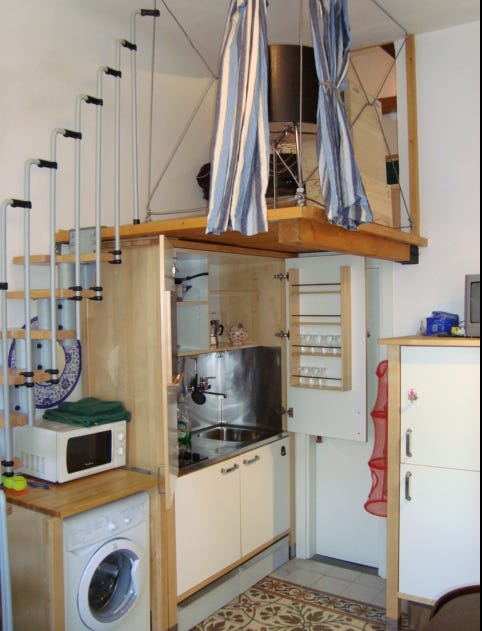
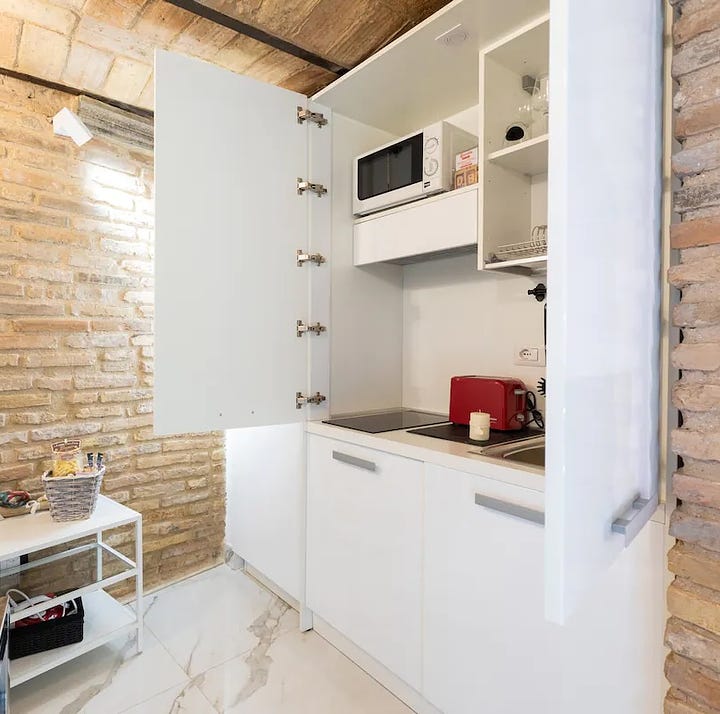
It became clear that my hope for such a kitchen, and my budget, did not “marry well” as goes the Italian phrase.
One day, I viewed an apartment in a new complex. I knew, at €600,000 it was twice my budget, but the realtor told me it had radiant floor heating and a garden, and I couldn’t resist seeing it— purely for dreaming sake.
After going through the most uncomfortable winter of my life that year in a drafty, rustic, countryside place with no heat—converted eons ago from a stone pig barn—the thought of radiant floor heat, and new, air-tight construction sounded like Heaven.
Despite the new construction where the kitchen could have been placed anywhere, it was still enclosed by walls with no window. But, the apartment got big points for the radiant floor heating. Other “new build” places I saw were still putting radiators on the walls like they’ve done for a hundred years, even though radiant floor heat lowers the heating bills and frees up space so that furniture is not competing for wall space with radiators.
I went to another construction site with another realtor. An old building in the center was being gutted. New, modern apartments going in. I followed him through the construction zone of what was to be a ground floor apartment. The floors were damp dirt, and in the tiny rooms the ancient stone walls oozed wet grout.
The apartment opened to what would be a tiny garden. Some sun would come in there, making it a great place for the kitchen, with a window where the only source of natural light would enter.
My heart sank when we viewed where the kitchen was to be. A windowless room at the back. By default, the kitchen was going into a closet without considering that it might be nicer to put it near the light.
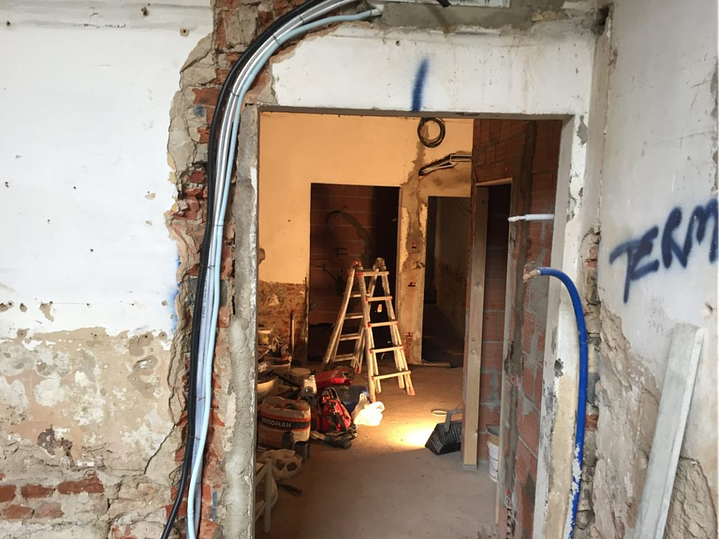
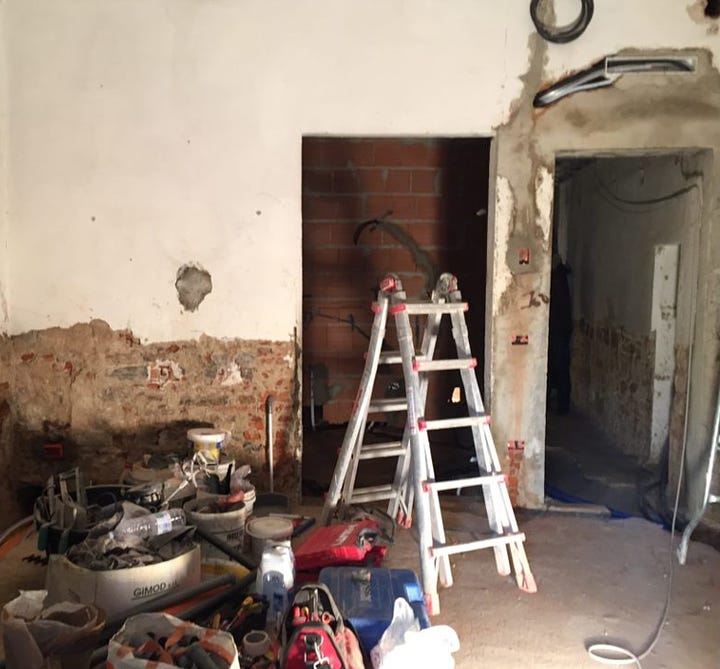
Behind the ladder, where the brick wall is. Yup, in a closet with no window.
I paused at the muddy trench to ask the workers if they had considered radiant floor heating.
“Oh no,” they replied. “We’re putting in radiators.”
“Isn’t it worth considering when you’re gutting a place? It lowers the heating bills.”
“We’re very behind you Americans,” one of them said.
“The Swedes do it. They’ve been doing it for ages. So it is here in Europe.”
“But we’re afraid of it,” the realtor said.
“If you tried it, you’d love it. It’s fantastic,” I said.
Italians are creative with art, food, and fashion. But with kitchens and heating mechanisms there’s perhaps some rote repetition going on?
The Problem With Space
I told a friend in New York about an apartment I’d viewed in Florence—about the weird little mezzanine thing in the bedroom. An exceedingly narrow stair case led to a beam in the ceiling that I was supposed to duck under and then stay bent in half in order to somehow use this three feet of space.
The realtor crawled in and said, “this could be a child’s bedroom!”
“Huh?”
“It’s certainly useful for something!”
“It makes my back hurt just considering crawling in there,” I said, remaining on the stairs.
I told my friend that additionally, there was zero closet space (which is exceedingly common) and she said as if she’d just realized it, “My God, it’s like looking for housing in New York, where people are willing to pay astronomical amounts to be in minuscule funky places!”
Right. Fine for an airbnb. For people with one suitcase. But if you’re actually going to live in a place, you do need a few closets. To live without items for closets works if you’re on an off-the-grid island in Tonga, but not so much in a fashionable world-class city.
In the end I bought a place that was sorely in need of work— I took to calling it a warehouse once I started living there. What existed for a kitchen was utterly awful but the room was large and had potential for a spacious kitchen— one that could contain actual countertops and a pantry.
The apartment also had space for some good sized closets that could be planned into a remodel with a bit of thoughtfulness.
I thought I was through the hard part.
Silly me.
Epic Badassery Needed
The buying part was as mellow as burrata con melone under a lemon bower compared to living in a non-AC warehouse during the heat of summer with the dust of the dreaded trenches clogging the humid air.
It turns out, I wasn’t told that the electricity wasn’t up to code. Of course the realtor didn’t tell me. That’s a given, unfortunately. But neither did the geometra tell me 🤔🤷♀️ I have no explanation for this. I just soldiered on and started to collect info about how to fix it.
Not knowing about the electricity meant I didn’t know what “dreaded trenches” are. Thus, I was living there when the dreaded trenches occurred, which is not what you want to do. Trust me.
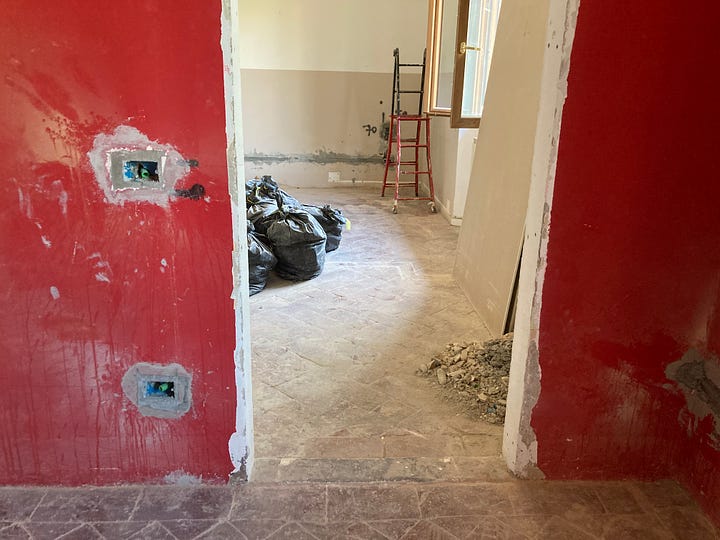
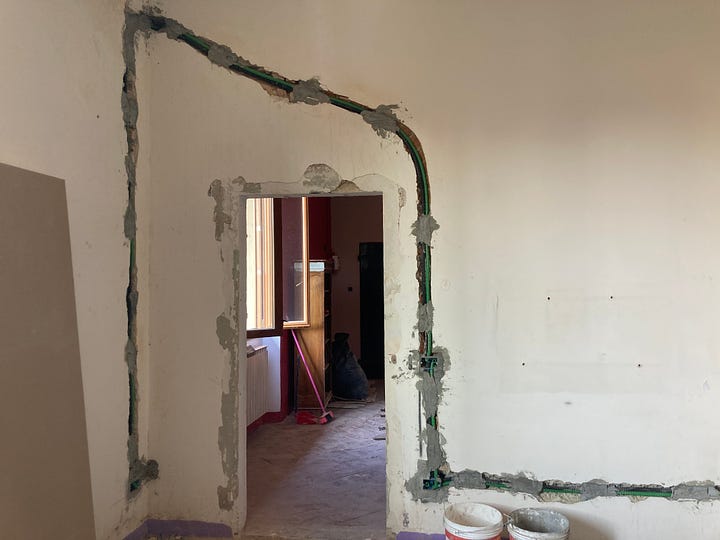
Then there was the shock of managing the workers. Each new set of workers for each different project I tackled as budget permitted, expressed confusion and surprise that I, a woman on my own, was in charge. Many repeatedly asked if I was married. Others tried more.
This is something for which I was not prepared, and it was an atmosphere I was in for two years.
My friend Kristen summed it up best. She said, “It takes epic badassery to remodel in Italy.”
Particularly for single woman it takes seriously epic badassery. (Unless you wash your hands of participating in it at all, and stay well away the whole time with someone else in charge.)
I want you to know this before you go into it so you don’t have quite the shock I had!
I’m happy to answer questions about the process. Feel free to ask in the comment section!
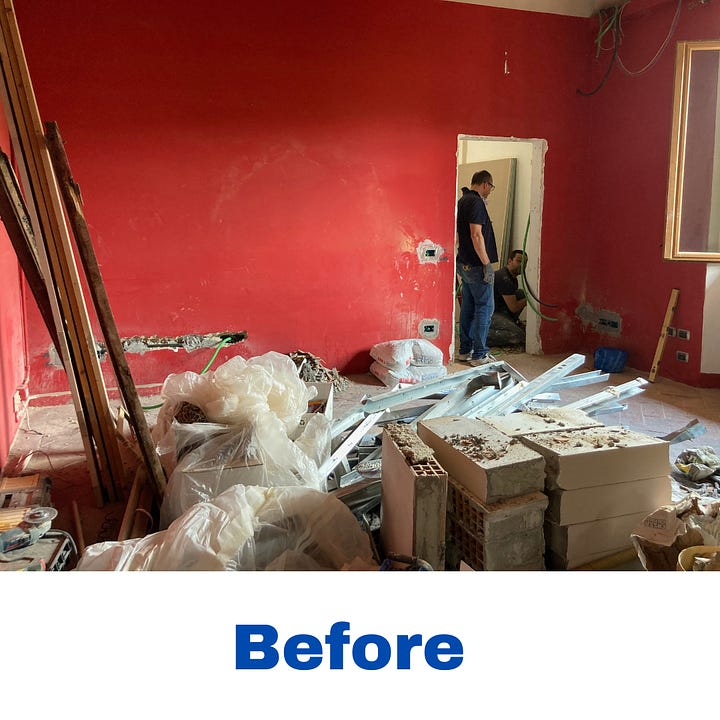
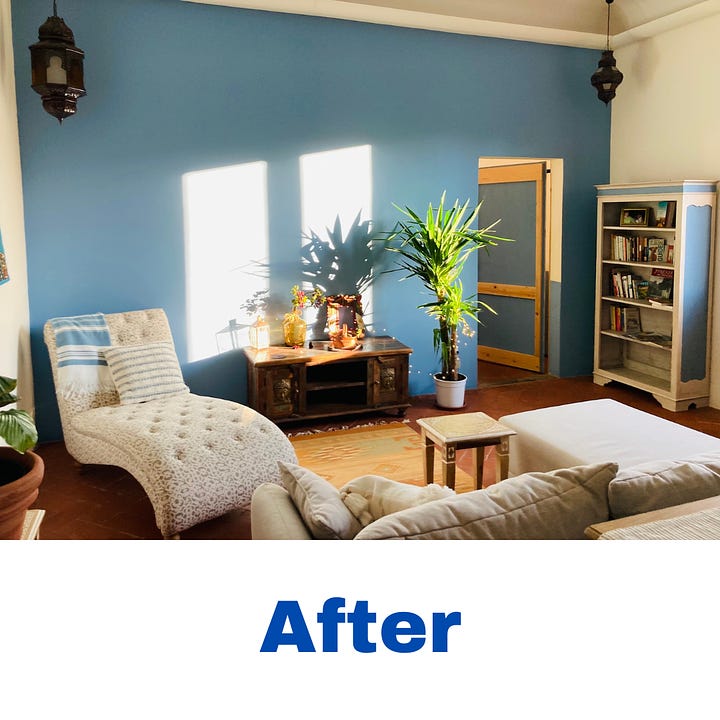
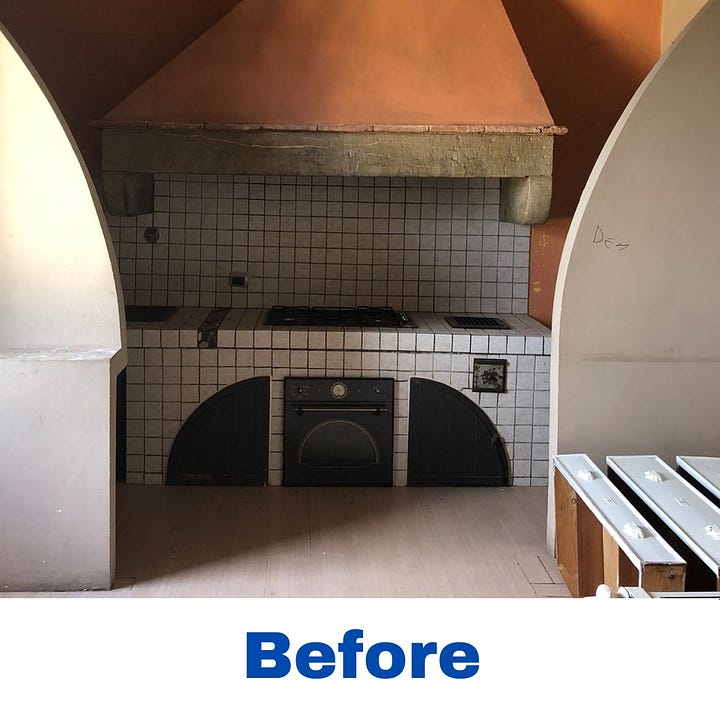
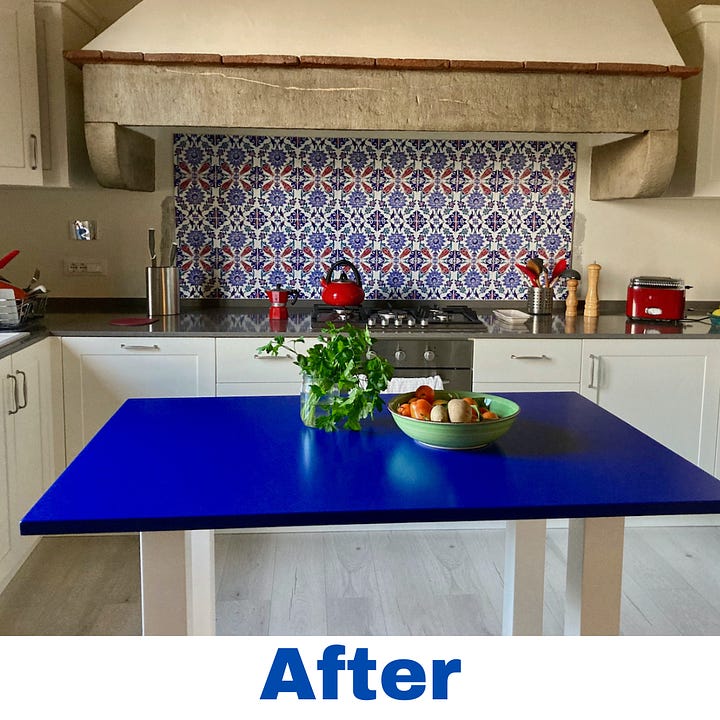
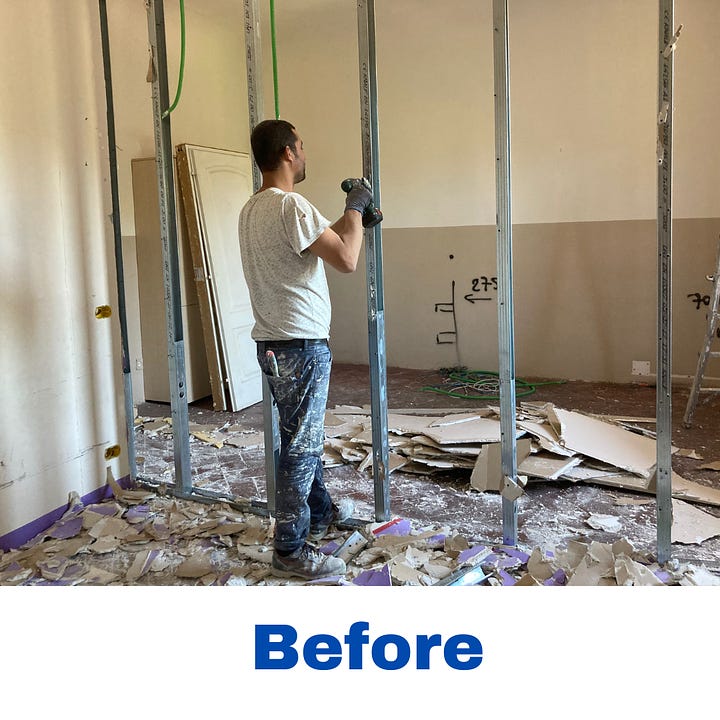
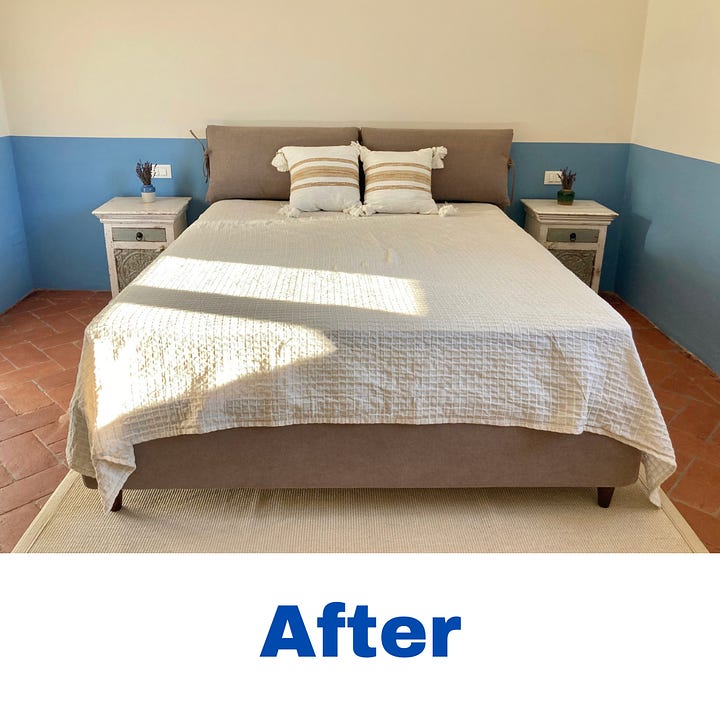
More of my remodel stories:


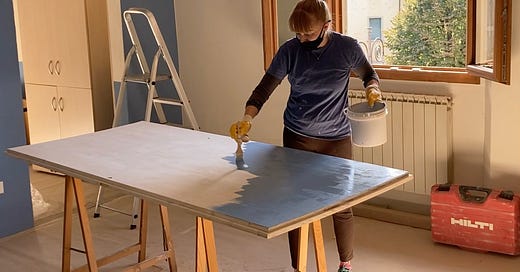



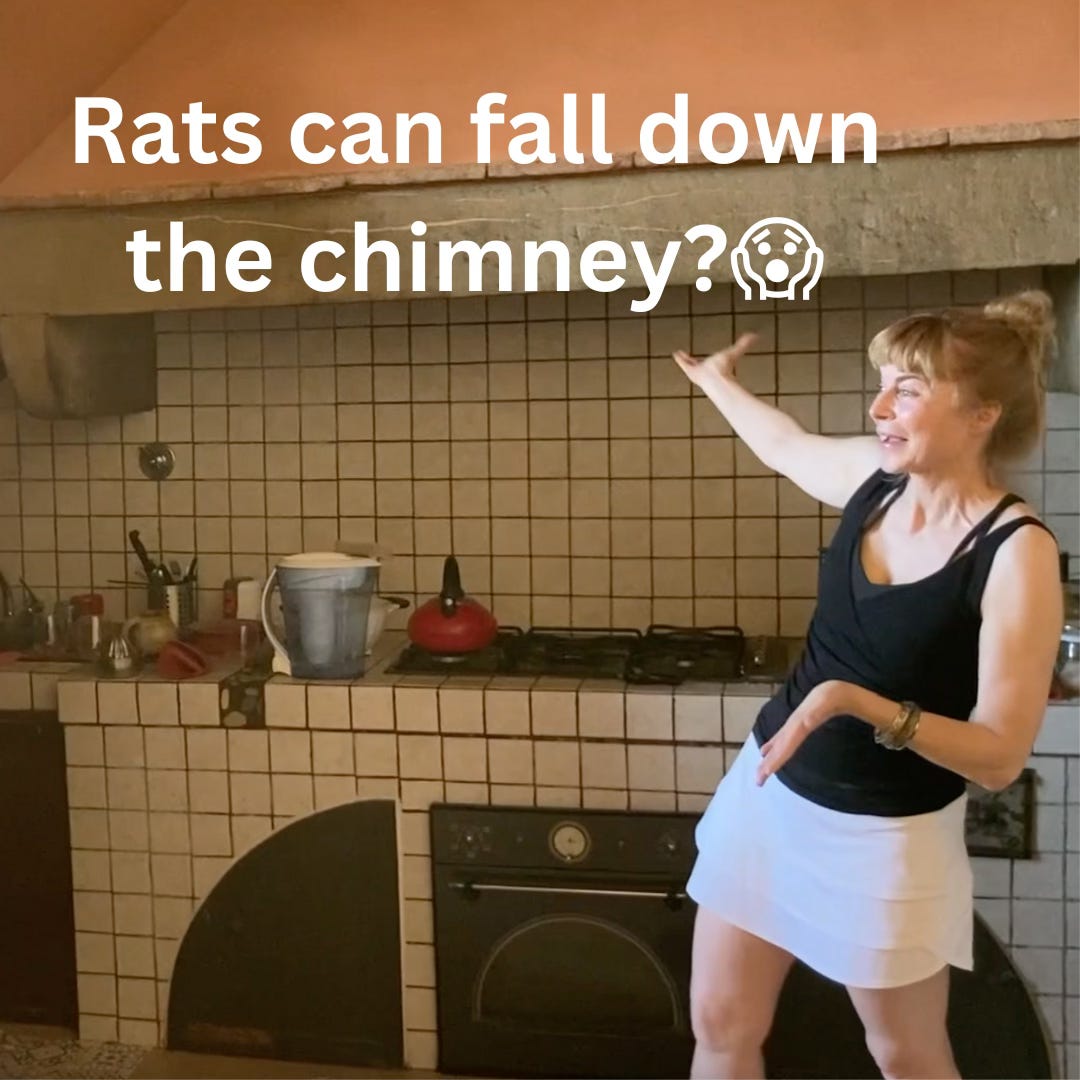
Oh you & I need to meet and have a loooong talk. We are going to need wine. Our buying process was a nightmare (a ridiculous agent, an angel of a seller) We put in radiant heating. We are now at the absolute worst part of the entire process. Our things arrived from Rome last week but the stairs are not finished, the kitchen is still in the cortile & there is no electricity downstairs. All that said, thank goodness for good engineers.
Hello, I'm looking for someone (not a realtor apparently) to show me a few properties in Southern Tuscany -- away from the HUGE crowds -- though I know nowhere is truly safe. Thinking just over the border from Umbria or maybe northern Umbria. Anyone have a recommendation for someone who might spend a day with me (even for a fee?) I'll be in Italy mid October.